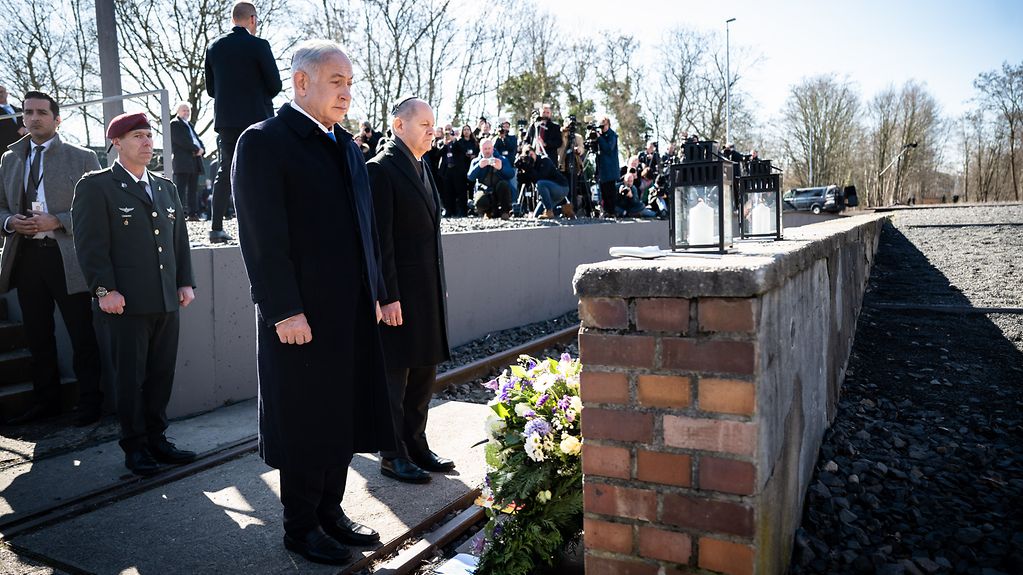Scholz welcomes Prime Minister Netanyahu
The friendship between Germany and Israel is a precious gift said Federal Chancellor Scholz following the visit of Prime Minister Netanyahu. He stressed that Israel could expect Germany to uphold its responsibility towards the safety and security of Israel.
4 min reading time

Federal Chancellor Scholz and Prime Minister Netanyahu commemorate the deportation of many Jews at the Platform 17 memorial. “It was a deeply moving moment,” said the Federal Chancellor.
Photo: Federal Government/Steins
On Thursday the Federal Chancellor welcomed the Israeli Prime Minister Benjamin Netanyahu to talks in the Chancellery. Earlier the two leaders visited the Platform 17 memorial to commemorate the deportation of 50,000 Berlin Jews. Scholz assured Netanyahu that “the security of Israel is and will remain the raison d’etat of Germany.”
In their talks later that day, the two leaders discussed a range of regional and international issues. These included the role of Iran and Russia’s war against Ukraine, as well as the Middle East conflict and planned justice reforms in Israel.
“Iran cannot be allowed to obtain nuclear weapons”
Netanyahu and Scholz expressed their shared concern at Iran’s enrichment of uranium and the role the country is playing in the Middle East. The Federal Chancellor noted that Iran was not only supporting armed groups in the region but also supplying arms to Russia which were being used to attack Ukraine. Scholz made it clear that “Iran cannot be allowed to obtain nuclear weapons” and called on Iran to “put an end to its destructive activities.” The two leaders also sharply condemned the Iranian government’s violence against its own citizens.
Middle East Conflict – working towards a two-state solution
The Federal Chancellor also expressed his sympathy for the victims of the most recent terror attacks in Israel. “We are dismayed at this thoughtless violence,” he said, while stressing that this violence must be countered with the rule of law, while at the same time warning against “unbridled vigilantism”.
He also emphasised Germany’s attitude towards the Middle East Conflict, emphasising that “a sustainable solution which makes it possible for Israelis and Palestinians to live in peace and security can only be achieved through a two-state solution.” For this reason, he said, Germany was calling on all parties to step back from unilateral actions which run counter to this goal. “This includes the building of new settlements,” said the Federal Chancellor.
At the same time he called on Palestinian leaders to live up to their responsibility for building a peaceful and democratic Palestine.
Serious concerns over Israeli justice reforms
Concerning the planned reforms of the Israeli justice system, Scholz said he and Netanyahu agreed that an independent justice system was a great democratic good, but at the same time he made it clear that “as partners in democratic values and close friends of Israel, we are paying close attention to these debates and – I will not try to conceal this fact – with great concern.”
For this reason, he said, it was good and worthwhile that Israel's President Herzog had spoken with a range of stakeholders in society in order to counter further polarisation. The Federal Chancellor underlined his belief that efforts to find the broadest-possible social consensus was “right and proper”. On the topic of the Israeli president’s specific proposals to resolve the issue, Scholz said: “As friends of Israeli we hope that the final word has not yet been uttered about these proposals.”
Germany, Europe and Israel are side by side with Ukraine
Scholz thanked Netanyahu for committing to further humanitarian aid and other support for Ukraine. On the topic of Russia’s brutal invasion of Ukraine, he made it clear that “this flagrant breach of international law is and will always be completely unacceptable,” and he called on Putin to end his war of aggression and withdraw his troops.
Combating antisemitism and promoting youth exchanges
At the end of his remarks the Federal Chancellor stressed that strengthening and promoting Jewish life in Germany was an important issue for him and the whole Federal Government. This included learning the lessons of the past and “consistently opposing all forms of antisemitism.” Scholz said it was particularly important to step up shared exchanges between young people from Germany and Israel and also to develop the German-Israeli Youth Organisation.
Joining in commemoration at the Platform 17 memorial
Before their joint talks, the two leaders commemorated the deportation of Berlin Jews at the Platform 17 memorial. After laying a wreath and a period of silent reflection, Scholz stressed Germany’s responsibility to protect Jewish life in Germany. After the talks, Scholz spoke of how “out of the dreadful past for which Germany is responsible, we draw a lasting obligation for the future.” The Shoa, Scholz said, “is a crime against humanity and a past that will never fade away.”
The Platform 17 memorial commemorates the deportation of over 50,000 Berlin Jews under the Nazis. On 18 October 1941 the first trains of the German Reichsbahn took transports from Berlin to ghettos, concentration camps and death camps in occupied Eastern Europe. The platform has been taken out of service and now bears a chronological list of every deportation which left Berlin from 1941 onwards.